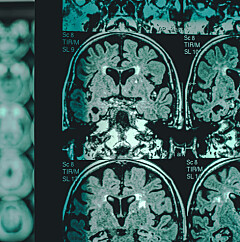
Researcher: This is what characterizes the dementia Bruce Willis has
The famous actor has been diagnosed with frontotemporal dementia. This is a disease that is difficult to diagnose and is very painful for relatives.
Last year, Bruce Willis had to put his acting career on hold because he had been diagnosed with aphasia, which made it difficult for him to understand and remember what he read.
Recently, it became known that he has been diagnosed with frontotemporal dementia. The family of the 67-year-old American actor took to social media to talk about Willis’s diagnosis.
After this, the word ‘frontotemporal’ was searched for on Google more than it ever has been, according to the Norwegian National Centre for Ageing and Health (link in Norwegian).
Since this type of dementia fundamentally changes a person’s personality and behaviour, relatives may feel that the person they live with has become more like a stranger, according to a Norwegian study.
Interviewed relatives
Associate Professor Hege Rasmussen Eid works at the Faculty of Nursing and Health Sciences at Nord University. She interviewed 14 relatives of Norwegian patients with frontotemporal dementia for her PhD at the Norwegian University of Science and Technology (NTNU).
She believes that the media coverage of Willis’s diagnosis has had a positive effect.
“This is a type of diagnosis that relatives and healthcare personnel need to know much more about,” she said to sciencenorway.no.
Frontotemporal dementia is a relatively uncommon disease and is estimated to account for close to two per cent of all dementia cases in Norway, or about 2,020 people a year.
“But the unaccounted for numbers can be large,” Eid says.

Little knowledge
It takes a long time from when the first symptoms appear to when the patient receives a diagnosis.
In Norway, it can take an average of five years.
One reason for the long time to diagnosis is that frontotemporal dementia differs significantly from other dementia diseases, Eid said.
“Studies show that there is less knowledge about this type of dementia among ordinary people and healthcare professionals than about other, more common types, such as Alzheimer's disease,” she said.
Different than other types of dementia
The average person on the street often associates dementia with poor memory.
But with frontotemporal dementia, the patient’s memory can be preserved long into the course of the disease.
The first symptoms generally manifest as changes in personality and behaviour.
There can also be changes in language.
These symptoms are not normally associated with dementia.
Can affect different places in the brain
Frontotemporal dementia is a collective term for several brain diseases that affect the front part of the brain.
Most people are affected in their 50s and 60s. But it can also strike people as young as in their 30s, Eid said.
What happens is that brain cells in the frontal and/or temporal lobes disappear over time.
“If you develop the disease in the temporal lobe, it affects language. In this situation, among the first symptoms are problems with language (aphasia),” she said.
The frontal lobe has important functions for managing emotions, empathy, social interaction, motivation, insight and impulse control, Eid said.
“If you develop the disease in that part of the brain, one of the symptoms is a lack of self-awareness. So you don't even know that your behaviour has changed,” she said.
Saying exactly what they think
These patients may say exactly what they think, even if others perceive what they say as rude.
They don’t listen to what other people say, and lose their ability to empathize.
Lars-Olof Wahlund, a professor of geriatrics at the Karolinska Institutet in Stockholm, described these symptoms in an interview with the Swedish news magazine Dagens Nyheter.
He believes that the lack of empathy is the hardest part for relatives.
Less well studied
Eid has been interested in studying frontotemporal dementia for a long time.
“It started with me taking additional education in mental health work. At that time, I had an internship in a department where there were several people with this disease. There was a lot of challenging behaviour. It made an impression on me to see how vulnerable these patients were,” she said.
When she was about to take her doctorate at NTNU, she discovered that little research had been done on this type of dementia.
What increases the risk?
We now know quite a lot about what increases the risk of Alzheimer's disease.
However, we know little about the risk factors for frontotemporal dementia.
Studies show that around 40 per cent of cases with frontotemporal dementia are due to genetics, while 60 per cent of those affected do not have dementia in the family.
This may mean that many cases are related to risk factors that could be influenced.
But there hasn’t been much research on the risk factors for this disease.
Eid conducted a literature study on risk factors for her doctorate. She found one study that pointed to diabetes as a risk factor, while three pointed to head trauma.
“I would summarize my findings by saying there isn’t enough known to recommend lifestyle changes to prevent this type of dementia,” she said.
Difficult to study
This disease is difficult to study, Eid said, partly because no one knows how long the disease takes to develop.
Some of the first symptoms may be that you start eating or smoking more, for example.
“It can be difficult to know if this is a change in lifestyle or a disease,” she said.
The disease causes a good number of symptoms linked to psychiatric issues, such as depression, mania, compulsion and psychosis.
“This means that some patients live with the wrong diagnosis,” Eid said.
Gradually becomes a stranger
Eid interviewed 14 relatives for her study. She was particularly interested in the earliest phase of the disease.
Her interviewees said that they experienced various changes in their relationship with the patient.
“The first thing these relatives experienced was that there was a lack of interest and emotional contact. There was a distance in the relationship. The person became more irritable,” Eid said.
The relatives did not interpret this as illness. Several thought it might just be a bad period in their relationship.
Eventually, the person concerned lost interest in family and hobbies.
After a while, relatives felt that the change in personality and behaviour made it feel like the person they lived with had become like a stranger.
Exhausting for relatives
When the patient does not have insight into his or her own illness, it can be difficult for relatives to contact healthcare personnel.
Several of the people Eid talked to experienced not being taken seriously.
A patient has to be lucky to get an early diagnosis, she said.
“In that case, you have to see a GP who will take this seriously and refer you to the specialist health service. Then you have to be lucky enough to work with a professional who has experience in investigating this disease,” she said.
“It’s exhausting for relatives.”
Eid now has an ongoing research project that looks at the follow-up these patients receive from the municipal health service in Norway. There, she sees that it is very important to include relatives throughout the process.
“Relatives are an incredibly important source of information. But it’s very demanding, of course, when the patient doesn’t have insight into his or her own illness and may not want help,” she said.
Translated by Nancy Bazilchuk
———
Read the Norwegian version of this article at forskning.no





































